You have probably heard the saying don’t mix business with pleasure, but have you heard the slightly less-known saying don’t mix business income and personal income? It’s something as essential to remember for small business entrepreneurs just starting out. Making the distinction between business income vs personal income can save you many headaches, legal battles, and time. You don’t have to be a business wiz or hire a team of accountants to help you in this process. As Marcus says, “You don’t have to be a genius to run a successful small business, but you better be smart enough to be willing to learn.” Here’s how you can learn to separate your business income from your personal income.

When You Break Open a Piggy Bank, You Can’t Put It Back Together
You have worked hard to build your business. Why would you do anything to jeopardize its success? Your business income has to remain separate from your personal income. Otherwise, you risk several damaging consequences. First, you may confuse your vendors and customers when they see your name pop up on their billing spreadsheet. It looks unprofessional, and it may give the impression that your company needs your cash to survive. It’s one thing to have skin in the game and another to have your finances where they don’t belong.
In the case of a retail popcorn company on the West Coast that Marcus considered investing in, this company’s finances were all over the place. Both figuratively and literally. After witnessing the owner’s mismanagement of her business income, poor decision-making skills by establishing a cash-only business, and lack of responsibility, it’s no surprise this company was losing hundreds of thousands of dollars a year. At one point, Marcus noticed thousands of dollars in cash scattered all over the floor in the owner’s office. Had this owner set up her business to take credit cards and debit cards, been more responsible with money, and stayed on top of her numbers, it would have resulted in a business that was more transparent, less vulnerable to theft, and well-respected with internal employees and outside investors.

The IRS makes clear definitions regarding business income vs personal income. Nobody wants to slog through an audit, especially a small business owner who doesn’t have the time or energy to spare. Again, this is about appearances. Entrepreneurs who don’t separate their personal and business income run the risk of the IRS assuming that their business is simply an amusing pastime, not a serious company. When that happens, all sorts of tax deductions and programs will no longer be available for use. Don’t shoot yourself in the foot come April 15th.
By clearly defining business income vs personal income, you are not only protecting your company but also protecting yourself. Suppose a deal goes sideways and your business finds itself unable to pay back creditors. They can dig into your financial records, and if they find that you’ve mixed personal and business income, then they can pursue your personal assets for compensation, even if you have an LLC. This is referred to as lifting the corporate veil, and while it’s uncommon, you should avoid it at all costs.
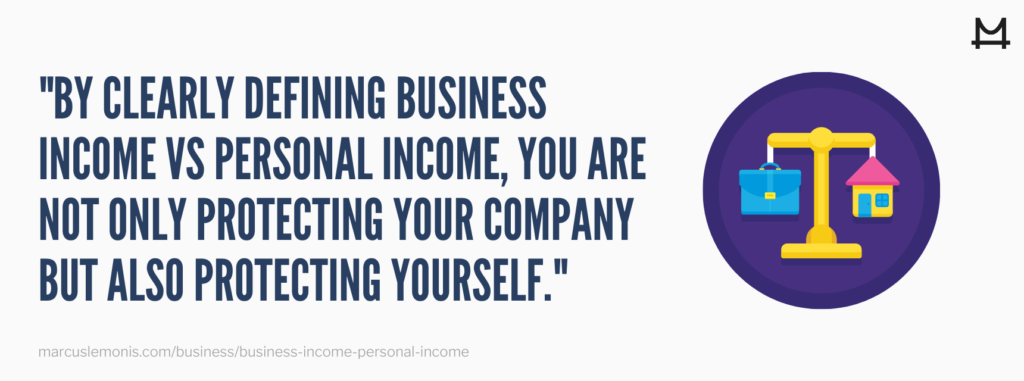
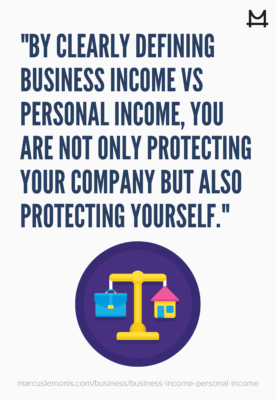
A Little Work Now Leads to Simplicity Later
If you don’t separate business income vs personal income throughout the year, you’re going to have a massive problem sorting through your individual taxes at the end of the year. Unexplained income and debt are a surefire way to flag yourself for an audit. It’s bad enough to use your personal money to fund your business, but when your employees start using their money to fund your business, well that’s a hard “no.” Such was the case when Marcus visited a retail fish market in the Northeast. The company was in financial trouble and behind on paying some of its employees. To make matters worse, some employees started using their own money to purchase inventory for the store. Not only is this unprofessional, but highly complicated to keep track of and to answer to the IRS later on.

Additionally, your time is valuable, and you’ll be wasting a lot of it trying to backtrack where your money went six, eight, or ten months ago. Do yourself a favor and put in the legwork throughout the year, little by little, and your personal taxes will be much simpler.
Income separation also simplifies tax time for your business. Without the need to comb over every receipt and record, you will be able to easily transfer the numbers to your business’s tax return quickly. This requires year long accounting for business income, which may take a little more time than throwing your receipts and records into a drawer until late March. Still, it saves time (and stomach aches) in the long run.
Give Yourself Some Credit
You probably know roughly what your credit score is, but what’s your business credit score? Not making a clear separation between business income vs personal income makes it challenging for creditors and banks to determine your business credit.
It boils down to keeping on top of your numbers and making sure you keep a clear paper trail that shows that you and your business aren’t one and the same. Simply put, to build your business credit, remember what Marcus says. “We have to know how much money we have, what we’re spending it on, and keep track of our expenses at all times.”
One issue that may arise with small-business owners just starting out or entrepreneurs without a track record of building successful companies is that sometimes you may have to rely on your personal credit to provide capital for your business. If you can’t present a track record of reliable business income, then lenders can only rely on your personal guarantee to be held responsible for potential losses. This doesn’t mean that there no longer exists a separation of business income vs personal income, however. In fact, it’s the opposite. You should strive to build your company’s credit on its own merits, then readjust the terms of your loans to remove yourself from the equation.
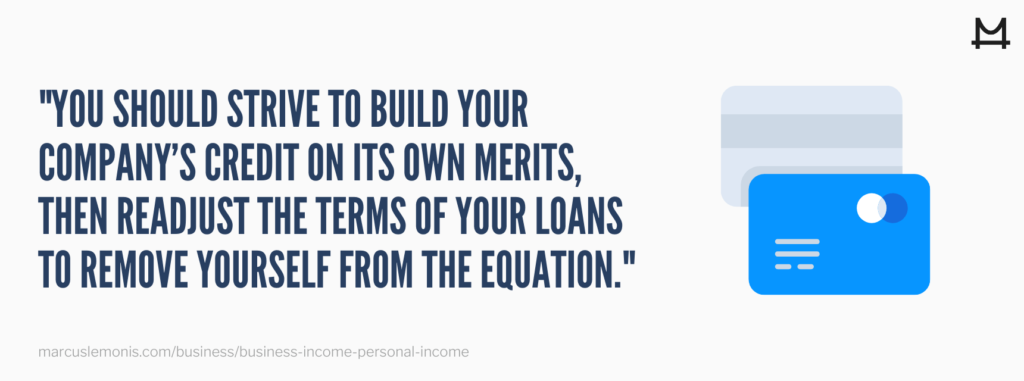

Five Easy Tips to Help You Keep Personal and Business Income Separate:
1. Legally Register Your Business
A limited liability company, or LLC, is often the first step business owners take to establish their company’s independence. Consult an attorney or your accountant to figure out if this is the correct definition for your company. Another option is to incorporate your business. There are varied reasons for choosing either route, and we encourage you to find out from a professional which one is right for you. Both provide some cushion of liability and help you separate your business income vs personal income.
2. Get Access to Business Credit or Debit Cards
After registering your company, you can now seek business credit in your business’s name. If you use a personal credit card to fund your enterprise, you run the risk of damaging your credit score. Brian Chesky, CEO of Airbnb, racked up over $25,000 in personal credit card debt while trying to get his company off of the ground. (Chang, 2018). Some industry insiders place a value of up to $40 billion on Airbnb’s upcoming IPO, but how many companies can rely on that kind of growth? (Mackay, 2020). As Marcus says, “At the end of the day, the numbers don’t lie.” If you can’t guarantee massive growth with zero downsides, separating your personal and business income is the only way to go.

3. Get a Checking Account
It’s near impossible to operate a company from a single bank account. When you can’t differentiate business income vs personal income, problems arise. And, as careful as you are, something is sure to slip through the cracks. Luckily, creating a new checking account for your company is the easiest step you can take to create separation. Having different debit cards for yourself and your company will make payment mistakes less likely to happen.
4. Always Keep Your Receipts
“You want a receipt with that?” There’s a reason why most companies, from gas stations and convenience stores up to high-end electronics dealers, have their cashiers utter that line. In business, every receipt counts. You may want to keep all of your receipts in separate folders dedicated to each type of purchase that is withdrawn from your business income account. These can be physical paper folders, or you can go high tech and scan each receipt to store in a virtual folder on your secure cloud or server. Not only does this help differentiate your business income vs personal income, but it will also help if the IRS ever launches an audit against you or your company. If you can’t track your purchases, then you don’t know your numbers.
5. Draw a Salary
Everybody needs personal income to pay bills, buy food, put a roof over their head, or catch a movie. You should be drawing a salary from your business account to cover your living expenses. Make your salary a set number and schedule payday so you won’t be tempted to live below your means and withdraw money from the company whenever you need it. Warren Buffett is synonymous with Berkshire Hathaway, the $530 billion holding company. Still, the third richest man in the United States only draws a $100,000 salary from his company. Why? He doesn’t need more than that to have a comfortable life. He doesn’t have to personally fund business acquisitions such as Berkshire Hathaway’s purchase of Precision Castparts Corp for $37.2 billion. (Alavia, 2015). Give yourself enough to be comfortable and leave the rest with your company to build for the future.
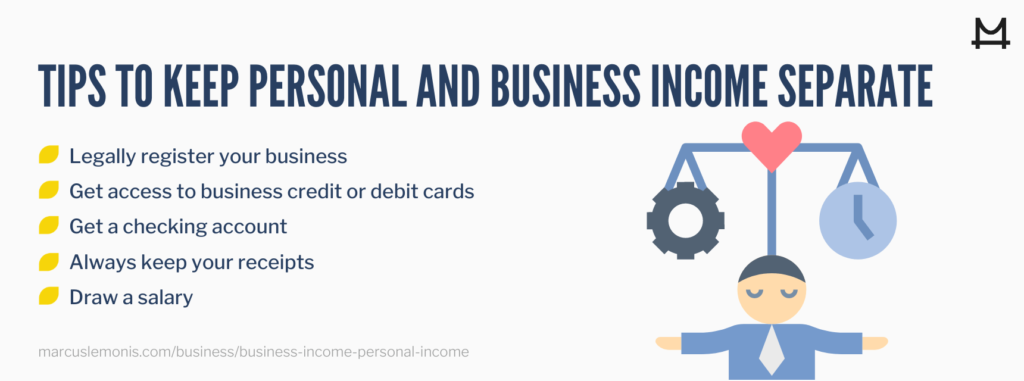
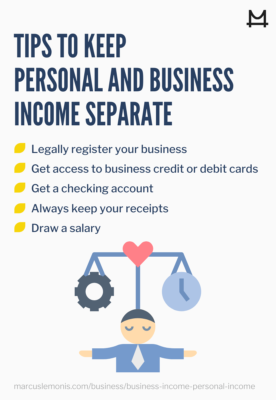
Respect Your Money and Respect Your Business
Sure, it takes a little bit of work to separate your company’s income from your own, but it saves time and money in the long run. Most of the steps you have to take to create that separation will have to happen eventually when your business expands. Taking a proactive approach will allow your business to grow gracefully. Your taxes will be simpler, your business will grow its credit, and you will gain more respect for how successful your company becomes. When asked about what sets him apart from other people, Marcus responded, “I respect money and I think that a lot of people don’t.” Respect your money and keep your business income separate.
- Do you currently have your business accounts separate from your personal ones?
- What steps can you take to begin separating the two?
Alavia, S. (2015, August 10). Warren Buffett’s 5 biggest acquisitions.
Retrieved from https://www.foxbusiness.com/markets/warren-buffetts-5-biggest-acquisitionsChang, E. (2018, January 24). Don’t do this: business empires built on credit cards.
Retrieved from https://www.thestreet.com/personal-finance/credit-cards/avoid-using-credit-cards-to-fund-your-new-business-14460162#:~:text=One%20of%20the%20most%20famous,tens%20of%20thousands%20of%20dollars.Mackay, K. (2020, August 27). Airbnb IPO – Is a $40 billion valuation possible in 2020?
Retrieved from https://www.valuethemarkets.com/2020/08/27/airbnb-ipo-is-a-40-billion-valuation-possible-in-2020/





